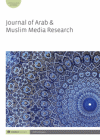- Home
- A-Z Publications
- Journal of Arab & Muslim Media Research
- Previous Issues
- Volume 8, Issue 1, 2015
Journal of Arab & Muslim Media Research - Volume 8, Issue 1, 2015
Volume 8, Issue 1, 2015
-
-
Egypt shifts towards a networked journalism paradigm
More LessAbstractThis study attempts to explore the relationship between the role of the traditional press, the output of social media as it emerged during the 25 January 2011 revolution, the 30 June 2011 protests and beyond; and also to determine if the mainstreaming of social media changed journalism practices in Egypt. The findings of this study indicate that there has been a significantly increased flow of citizen-generated content into journalism practice, although there is also a certain amount of resistance to its use. Findings also suggest that a traditional gatekeeping approach is the preferred model for governing this flow; yet, editorial structures and mechanisms to govern this model are not in place generally. Nonetheless, this uncertain transition period appears to harbour the possibility of better quality journalism in a networked future.
-
-
-
Media propaganda and human rights issues: What can be learnt from the former Yugoslavia’s experience in relation to the current developments in the Arab Spring countries?
More LessAuthors: Renaud de la Brosse, Nouri Lajmi and Annelie EkelinAbstractRecent history has proven that media propaganda can impact severely on human rights issues. This article aims at exploring what can be learnt from previous lessons in order to avoid the same mistakes happening again and/or to fight them more efficiently. It questions the experience of the former Yugoslavia in relation to the current developments in the Arab Spring countries. The propaganda theory is applied for an analysis of how the media were instrumentalized for political and nationalist goals under Milosevic’s regime. Through content discourse analysis, the techniques of media propaganda are described and analysed, and consequences are drawn. Although the situation varies from one case to another, widespread hate propaganda speeches in some Arab countries is a challenge to a successful political transition. This has been the case in Tunisia after the 2011 Revolution, where hatred messages have been widely spread by broadcast media and social networks. Propaganda theory has thus been applied to the specific case of broadcast television. The study shows that, contrary to some other countries, Tunisian society has its own peculiarities, and that it has succeeded in developing brakes that have reduced the scope and impact of propaganda messages of some extremist media. In view of past experiences, such as the former Yugoslavia or Rwanda, and in this context, this article also aims to demonstrate the full importance of the existence of quality public service media in the Tunisian case, and of an independent regulation of both traditional and social media. In its conclusion, this article also raises the question of social media regulation, which is all the more acute given that Tunisia is immersed in an environment where more and more hate content and stigmatization messages are developing.
-
-
-
Framing the Islamic State on Al Jazeera English and the BBC websites
More LessAbstractThis study examines the media coverage of the Islamic State (IS) currently vying to establish a caliphate in the Middle East. The websites of Al Jazeera English (AJE) and the British Broadcasting Corporation (BBC) were scrutinized in order to determine how they framed IS. This study suggests eight framing devices to this media coverage: the Islamic fundamentalist; religious differences/intolerance; crimes against humanity; the aggressive nature of IS; the aggressive nature of coalition forces; a desire for peace; religious tolerance; and humanitarian. Results suggested that both AJE and the BBC frame IS as an aggressive entity with fundamentalist tendencies, whose main agenda centres on fighting against those who stand in its way. The study also highlights how the coalition forces are similarly framed as having an aggressive nature, although this aggressiveness is warranted, since they are ‘the forces of good fighting against evil’. Results also suggest that IS is framed as an extremist organization that exhibits considerable religious intolerance. Coverage by AJE and the BBC also tended to humanize the victims and to dehumanize those who were victimized.
-
-
-
Jordanian journalists’ awareness of the concepts and standards of journalistic quality within Jordanian media institutions
More LessAbstractThis study aims to identify Jordanian journalists’ awareness of the basic concepts of journalistic professionalism by addressing four sets of media quality standards, as abstracted from several studies. Notable among those sets are journalistic content standards, the performance quality standards of newsrooms, institutional standards, and standards of news selection. Furthermore, the study attempts to identify the difference between an awareness of specific standards of professionalism and quality, and a realization of media institutions’ actual practices. The responses of 200 journalists revealed a reasonable awareness of the basic concepts of quality and professionalism. However, there was a gap between Jordanian journalists’ realization of quality and professionalism standards and media institutions’ actual applications of those standards. By way of concluding, this study recommended that media institutions should adopt quality concepts. In addition, they should bridge the gap between standards and actual media practices by means of independence protection; separation between ownership and editing; and restraining external intervention. Also, media institutions should work towards increasing the level of their performance quality with respect to localism standards, their use of sources, pluralism, accuracy, social responsibility, criteria of news selection, and preparing relevant guidelines.
-
Most Read This Month


